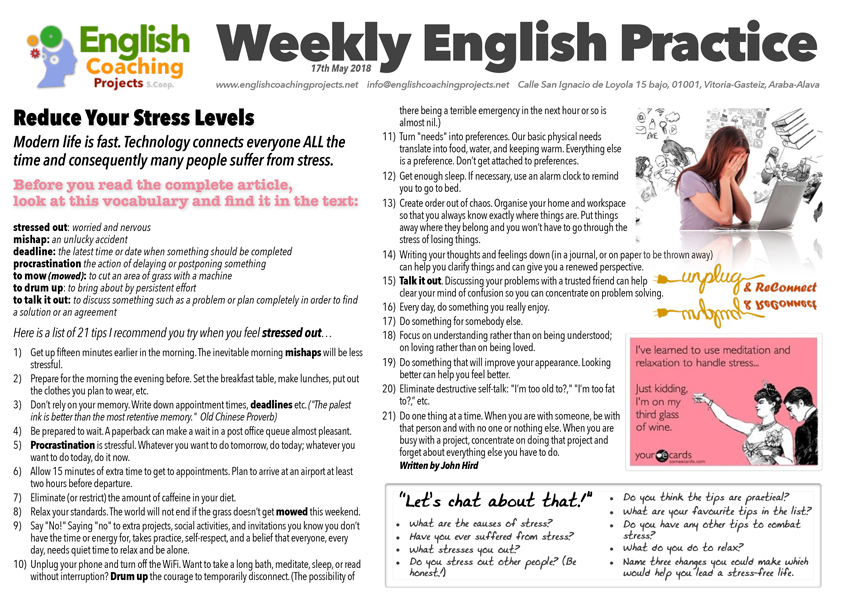Click on the image to download the pdf
Modern life is fast. Technology connects everyone ALL the time and consequently many people suffer from stress
Before you read the complete article, look at this vocabulary and find it in the text:
stressed out: worried and nervous
mishap: an unlucky accident
deadline: the latest time or date when something should be completed
procrastination the action of delaying or postponing something
to mow (mowed): to cut an area of grass with a machine
to drum up: to bring about by persistent effort
to talk it out: to discuss something such as a problem or plan completely in order to find a solution or an agreement
Listen to the audio
Here is a list of 21 tips I recommend you try when you feel stressed out…
- Get up fifteen minutes earlier in the morning. The inevitable morning mishaps will be less stressful.
- Prepare for the morning the evening before. Set the breakfast table, make lunches, put out the clothes you plan to wear, etc.
- Don’t rely on your memory. Write down appointment times, deadlines etc. (“The palest ink is better than the most retentive memory.” Old Chinese Proverb)
- Be prepared to wait. A paperback can make a wait in a post office queue almost pleasant.
- Procrastination is stressful. Whatever you want to do tomorrow, do today; whatever you want to do today, do it now.
- Allow 15 minutes of extra time to get to appointments. Plan to arrive at an airport at least two hours before departure.
- Eliminate (or restrict) the amount of caffeine in your diet.
- Relax your standards. The world will not end if the grass doesn’t get mowed this weekend.
- Say “No!” Saying “no” to extra projects, social activities, and invitations you know you don’t have the time or energy for, takes practice, self-respect, and a belief that everyone, every day, needs quiet time to relax and be alone.
- Unplug your phone and turn off the WiFi. Want to take a long bath, meditate, sleep, or read without interruption? Drum up the courage to temporarily disconnect. (The possibility of there being a terrible emergency in the next hour or so is almost nil.)
- Turn “needs” into preferences. Our basic physical needs translate into food, water, and keeping warm. Everything else is a preference. Don’t get attached to preferences.
- Get enough sleep. If necessary, use an alarm clock to remind you to go to bed.
- Create order out of chaos. Organise your home and workspace so that you always know exactly where things are. Put things away where they belong and you won’t have to go through the stress of losing things.
- Writing your thoughts and feelings down (in a journal, or on paper to be thrown away) can help you clarify things and can give you a renewed perspective.
- Talk it out. Discussing your problems with a trusted friend can help clear your mind of confusion so you can concentrate on problem solving.
- Every day, do something you really enjoy.
- Do something for somebody else.
- Focus on understanding rather than on being understood; on loving rather than on being loved.
- Do something that will improve your appearance. Looking better can help you feel better.
- Eliminate destructive self-talk: “I’m too old to?,” “I’m too fat to?,” etc.
- Do one thing at a time. When you are with someone, be with that person and with no one or nothing else. When you are busy with a project, concentrate on doing that project and forget about everything else you have to do.
“Let’s chat about that!”
- What are the causes of stress?
- Have you ever suffered from stress?
- What stresses you out?
- Do you stress out other people? (Be honest!)
- Do you think the tips are practical?
- What are your favourite tips in the list?
- Do you have any other tips to combat stress?
- What do you do to relax?
- Name three changes you could make which would help you lead a stress-free life.
Written by John Hird


